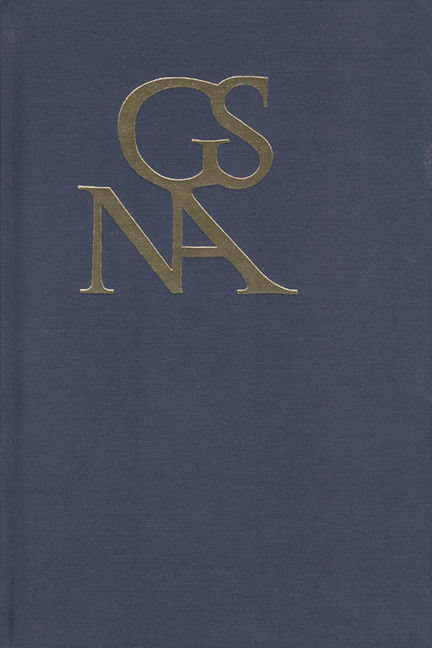Book contents
- Frontmatter
- Contents
- Reorientations around Goethe
- Reorientations around Goethe II
- Special Section on Goethe's Narrative Events edited by Fritz Breithaupt
- What Is an Event for Goethe?
- Much Ado about Nothing? The Absence of Events in Die Wahlverwandtschaften
- Countering Catastrophe: Goethe's Novelle in the Aftershock of Heinrich von Kleist
- Narrating (against) the Uncanny: Goethe's “Ballade” versus Hoffmann's Der Sandmann
- Remembering Klopstock's Mitausdruck
- Strategic Indecision: Gender and Bureaucracy in Schiller's Maria Stuart
- The Dark Green in the Early Anthropocene: Goethe's Plants in Versuch die Metamorphose der Pflanzen zu erklären and Triumph der Empfindsamkeit
- Abschlussbewegungen: Goethe, Freud, and Spectral Forms of Life
- Ein Mythos und sein doppelter Entzug des Modernen: Prämissen für einen Ausweg aus der Unübersichtlichkeit der Faustforschung
- Johann Wolfgang von Goethe in Conversation with Things
- World Literature Turns Political, 1835/36: The Early Afterlife of Goethe's Pronouncement in German Cultural-Politics and in the Young Germany Movement
- Fritz Strich and the Dilemmas of World Literature Today
- A Jewish Faust Commentary: Notes on Franz Rosenzweig's The Star of Redemption
- From Idylle to idílio: Mário de Andrade's Parody of Hermann und Dorothea
- Koselleck's Timely Goethe?
- Book Reviews
Strategic Indecision: Gender and Bureaucracy in Schiller's Maria Stuart
from Special Section on Goethe's Narrative Events edited by Fritz Breithaupt
Published online by Cambridge University Press: 26 June 2019
- Frontmatter
- Contents
- Reorientations around Goethe
- Reorientations around Goethe II
- Special Section on Goethe's Narrative Events edited by Fritz Breithaupt
- What Is an Event for Goethe?
- Much Ado about Nothing? The Absence of Events in Die Wahlverwandtschaften
- Countering Catastrophe: Goethe's Novelle in the Aftershock of Heinrich von Kleist
- Narrating (against) the Uncanny: Goethe's “Ballade” versus Hoffmann's Der Sandmann
- Remembering Klopstock's Mitausdruck
- Strategic Indecision: Gender and Bureaucracy in Schiller's Maria Stuart
- The Dark Green in the Early Anthropocene: Goethe's Plants in Versuch die Metamorphose der Pflanzen zu erklären and Triumph der Empfindsamkeit
- Abschlussbewegungen: Goethe, Freud, and Spectral Forms of Life
- Ein Mythos und sein doppelter Entzug des Modernen: Prämissen für einen Ausweg aus der Unübersichtlichkeit der Faustforschung
- Johann Wolfgang von Goethe in Conversation with Things
- World Literature Turns Political, 1835/36: The Early Afterlife of Goethe's Pronouncement in German Cultural-Politics and in the Young Germany Movement
- Fritz Strich and the Dilemmas of World Literature Today
- A Jewish Faust Commentary: Notes on Franz Rosenzweig's The Star of Redemption
- From Idylle to idílio: Mário de Andrade's Parody of Hermann und Dorothea
- Koselleck's Timely Goethe?
- Book Reviews
Summary
AT THE OPENING of Schiller's Maria Stuart (1800; Mary Stuart), the captive Queen of Scots has already been sentenced to death by the English House of Lords. The only question remaining is whether Queen Elizabeth, Mary's cousin and rival, will sign the death warrant. Mary lives as long as Elizabeth does not sign, and unless she is somehow freed, Mary's only hope is the mercy of the English queen. Meanwhile Elizabeth must choose between two unattractive alternatives: order the execution of not only a family member but a fellow monarch, thus exposing herself to the threat of regicide while giving discontented English Catholics a martyr in Mary; or let Mary live and continue to challenge the legitimacy of Elizabeth's reign, presenting herself as the rightful sovereign. Mary's refusal to sign the Treaty of Edinburgh and renounce her claim to the English throne make her an existential threat to Elizabeth's government—such, at least, is the argument for execution, a move that nonetheless carries unpredictable political and moral consequences. George Steiner calls Maria Stuart a “perfect” tragedy because neither queen escapes the desolation wrought by their shared circumstance: Mary dies a prisoner, a death determined by political necessity, while Elizabeth's decision leaves her politically secure but alone, abandoned by her allies, “charred and cold” when the final curtain falls.
Literature on the play has overwhelmingly focused on Mary, relegating Elizabeth to the fallen political world her rival seems to transcend. But the institutional and discursive conflicts driving Maria Stuart are most pronounced in Elizabeth's situation, not Mary's. While the heroine may suffer in a more obvious or philosophically enticing way, Elizabeth plays the crucial role of deciding the nature and circumstances of Mary's fate. This position puts her, rather than Mary, in line with Franco Moretti's criterion of tragic literature: “everything has its origin in the decision of the king … In the world of tragedy the monarch is truly absolute.” Maria Stuart both confirms and challenges this formula: the play revolves around a sovereign decision, but its monarch is not a king, and the conditions under which Elizabeth must decide are inseparable from the way she and her leadership are gendered.
- Type
- Chapter
- Information
- Goethe Yearbook 26Publications of the Goethe Society of North America, pp. 123 - 140Publisher: Boydell & BrewerPrint publication year: 2019



